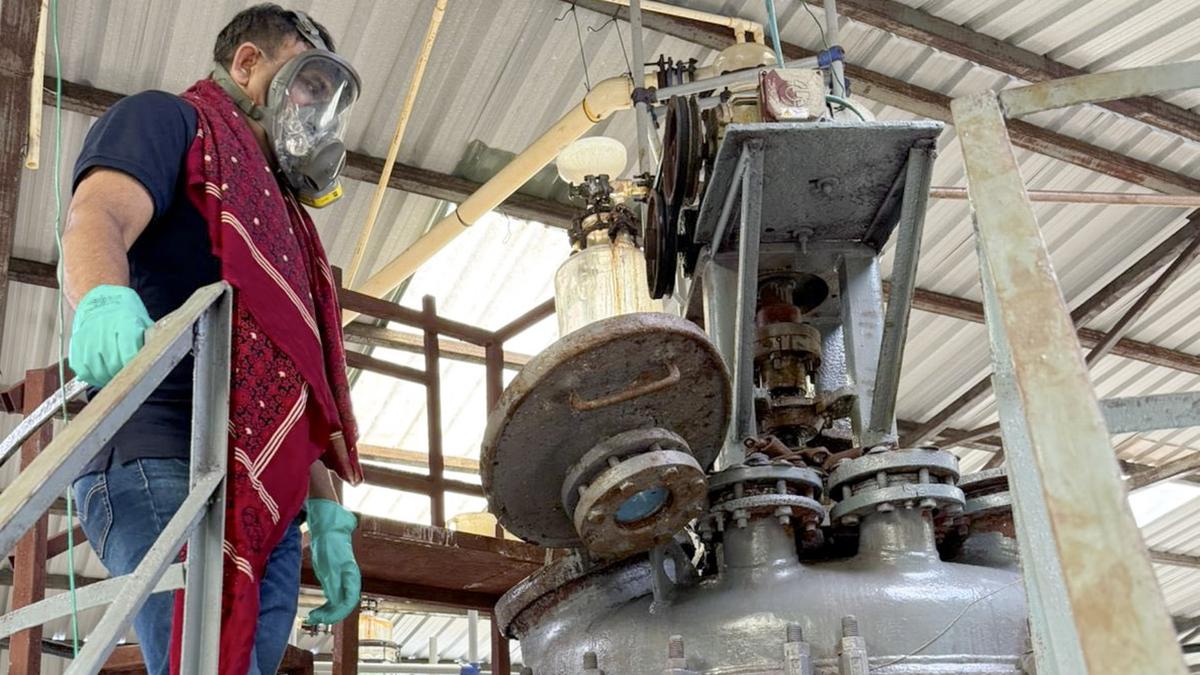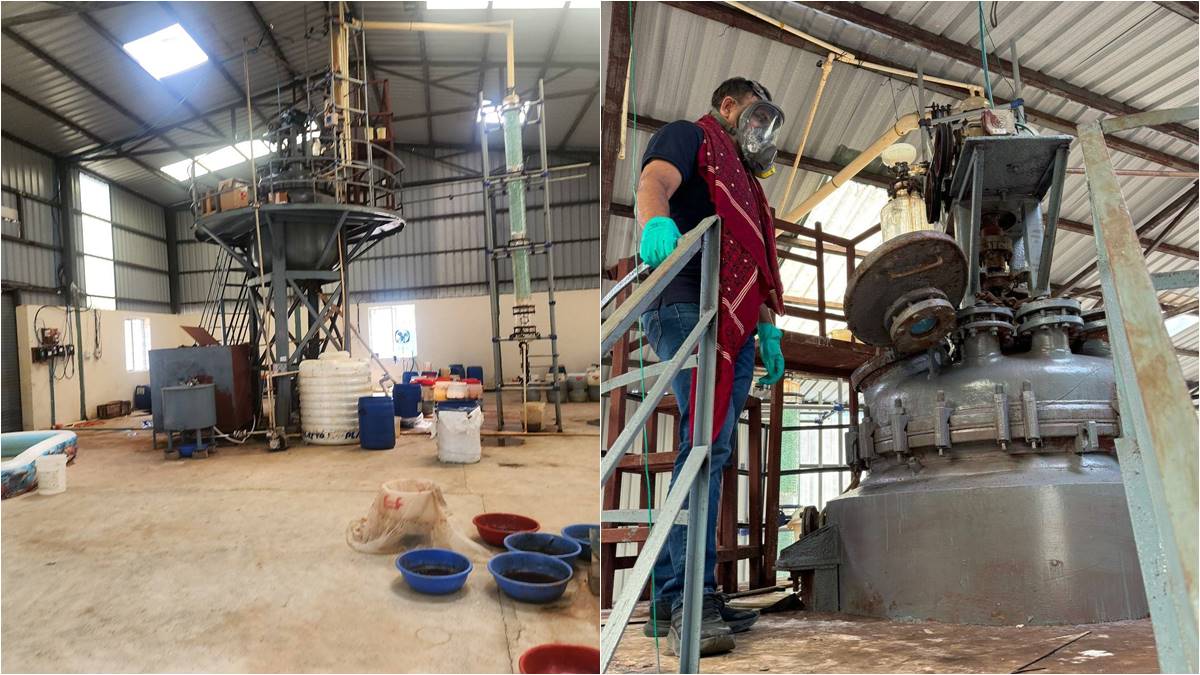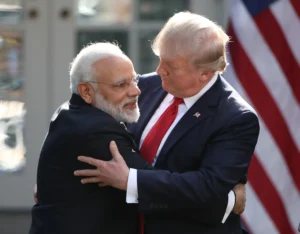
Joint Operation Leads to Record Drug Seizure in Bhopal: Mephedrone Worth ₹1,814 Crore

In a significant crackdown on drug manufacturing, the Gujarat Anti-Terrorist Squad (ATS) and the Narcotics Control Bureau (NCB) have seized a staggering ₹1,814 crore worth of mephedrone (MD) and its raw materials from a factory in Bhopal. This operation, conducted on October 6, 2024, marks one of the largest drug busts in recent history.
Details of the Operation
The raid took place at a facility located in the Bagroda industrial estate, approximately 10 kilometers from Bhopal. Authorities confiscated 907.09 kg of mephedrone in both solid and liquid forms. The factory was reportedly capable of producing 25 kg of MD per day, and production was actively underway at the time of the raid.
Arrests Made
Two individuals were arrested during the operation:
- Amit Chaturvedi, 57, from Kotra Sultanabad Road, Bhopal
- Sanyal Prakash Bane, 40, from Nashik-Gangapur Road, Nashik
Bane had a prior conviction related to drug offenses and had served five years in prison before partnering with Chaturvedi to establish this illegal operation. They had rented the factory about six to seven months prior to their arrest and began manufacturing MD three to four months ago.
Equipment and Raw Materials Seized
In addition to the mephedrone, authorities discovered approximately 5,000 kg of raw materials used for production. This included various chemicals and manufacturing equipment such as grinders, motors, glass flasks, and heaters. The scale of the operation highlights the sophistication involved in the illegal drug trade.
Government Response
Gujarat’s Minister of State for Home, Harsh Sanghavi, praised the efforts of law enforcement agencies in combating drug trafficking. He emphasized that this operation is crucial for safeguarding public health and security. The minister noted that such collaborative efforts between different agencies are essential in tackling drug-related crimes effectively.
Context of Drug Busts
This bust follows closely on the heels of another major drug seizure in Delhi, where authorities confiscated drugs worth approximately ₹5,600 crore. The ongoing investigations into these cases suggest an extensive network involved in drug trafficking across state lines and possibly international borders.The successful operation in Bhopal not only underscores the persistent threat posed by synthetic drugs like mephedrone but also highlights the importance of vigilance and coordination among law enforcement agencies to dismantle such criminal enterprises.

How did the authorities track down the factory in Bhopal
Authorities tracked down the illegal mephedrone manufacturing factory in Bhopal through a combination of intelligence gathering and ground surveillance. The Gujarat Anti-Terrorist Squad (ATS) and the Narcotics Control Bureau (NCB) received tips about the activities of Amit Chaturvedi and Sanyal Prakash Bane, who were suspected of running the operation under the guise of a legitimate manufacturing unit in the Bagroda Industrial Estate, located about 10 kilometers from Bhopal
.After receiving this intelligence, officers conducted thorough investigations to gather additional information, which included monitoring the facility’s operations. This groundwork culminated in a coordinated raid on October 6, 2024, during which authorities caught the suspects in the act of manufacturing drugs. The operation led to the seizure of 907.09 kg of mephedrone and approximately 5,000 kg of raw materials used for production.
The factory was strategically located in a relatively isolated area, allowing the suspects to operate without drawing much attention, which made the intelligence work even more critical for authorities in executing a successful operation.
What was the role of the Narcotics Control Bureau in this operation
The Narcotics Control Bureau (NCB) played a crucial role in the recent operation that led to the seizure of ₹1,814 crore worth of mephedrone from a factory in Bhopal. This operation was a collaborative effort between the NCB and the Gujarat Anti-Terrorism Squad (ATS).
Key Contributions of the NCB
- Intelligence Gathering: The NCB was instrumental in gathering intelligence about the illegal activities at the factory. They received confidential information indicating that Amit Chaturvedi and Sanyal Prakash Bane were engaged in the illicit manufacture and distribution of mephedrone under the guise of a legitimate business.
- Joint Operation Coordination: The NCB worked closely with the Gujarat ATS to plan and execute the raid. This coordination was vital for effectively dismantling the drug operation, which was capable of producing approximately 25 kg of mephedrone daily.
- Seizure and Investigation: During the raid, the NCB helped seize 907.09 kg of mephedrone in both solid and liquid forms, along with around 5,000 kg of raw materials used for production. The NCB is also involved in ongoing investigations to trace the supply chain, determine financial proceeds from sales, and identify other individuals linked to this drug cartel.
- Legal Proceedings: Following the arrests of Chaturvedi and Bane, the NCB is responsible for further legal actions against them and any potential accomplices involved in this extensive drug manufacturing network.
This operation underscores the importance of inter-agency collaboration in combating drug trafficking and highlights the proactive measures taken by law enforcement to address illegal narcotics production in India.
Conclusion
The recent seizure of ₹1,814 crore worth of mephedrone from a factory in Bhopal marks a significant victory for Indian law enforcement agencies, particularly the Narcotics Control Bureau (NCB) and the Gujarat Anti-Terrorism Squad (ATS). This operation not only disrupted a large-scale drug manufacturing operation but also showcased the effectiveness of intelligence gathering and inter-agency collaboration in tackling the pervasive issue of drug trafficking.The arrest of key figures involved in this illicit enterprise serves as a reminder of the ongoing battle against synthetic drugs and the importance of vigilance in safeguarding public health. As authorities continue to investigate and dismantle such networks, it is crucial for communities to remain aware and supportive of efforts aimed at combating drug-related crimes.This operation stands as a testament to the commitment of law enforcement agencies in India to protect society from the devastating effects of drugs, reinforcing the need for continued vigilance and proactive measures in the fight against substance abuse.
Discover more from
Subscribe to get the latest posts sent to your email.







